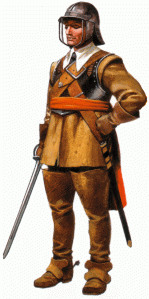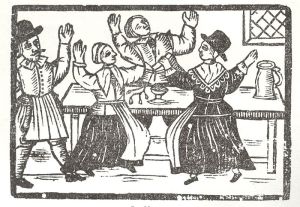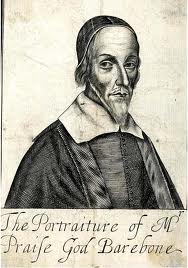 I am a Puritan fan. How could you not be? We’re talking about a bunch of people who, in the days when the future of Protestantism was insecure in Britain, got into trouble for saying that Britain was not protestant enough. When parliament raised its standard against the king, it was the Puritans who formed the New Model Army and won the day.
I am a Puritan fan. How could you not be? We’re talking about a bunch of people who, in the days when the future of Protestantism was insecure in Britain, got into trouble for saying that Britain was not protestant enough. When parliament raised its standard against the king, it was the Puritans who formed the New Model Army and won the day.
And they did it with style. I mean, they did it with Bible study groups, discussions about politics, and an sense of discipline based on a shared faith that allowed room for people to work things out for themselves.
Civil War is a horrible thing, but you’d be hard-pressed to find any group that made it look quite so good.
Obviously, their victory was short-lived, and in 1660 some people decided England should be a monarchy again. Just two years later, in 1662, Puritan priests were expelled from the Church of England if they refused to accept the revised Book of Common Prayer. Most became non-conformists. Puritans were banned from holding positions in the military, positions in government, and even from getting degrees from Oxford or Cambridge. These restrictions were in place till the nineteenth century, and weirdly, in this time Puritans got into business. The Quakers alone developed fixed prices for goods in shops, drinking chocolate, and set up lots of businesses that looked after their workers as well as they could.

They weren’t all humourless and restrictive either. There were groups like the Ranters who didn’t believe in sin, but did believe in dancing naked and drinking heavily. They were a diverse bunch. Perhaps the greatest legacy of the Puritan sense of humour is some of the names they gave to their children. Ostensibly, the goal was to give children godly names that wouldn’t be tainted by unbelievers using them. They also helped Puritans to recognise their own. But some Puritan names just got odd.
Here are some of my favourites. Most of these are courtesy of the brilliant Curiosities of Puritan Nomenclature. Weirdly for me, many of them originate from East Sussex, which means that most of the weirdest Puritan names in the country originate just a few miles away from where I’m sat now.
12 of the Worst Puritan Names
- Humiliation (Humiliation Hynde had two sons in the 1620s, he called them both Humiliation Hynde)
- Fly-debate
- No-merit (NoMerit Vynall was born in Warbleton, a haven of beautiful names)
- Helpless
- Reformation
- Abstinence
- More-triale
- Handmaid
- Obedience
- Forsaken
- Sorry-for-sin (Sorry-for-sin Coupard lived in Warbleton)
- Lament (Lament Foxe was born in 1594)
12 Strangely Pleasant Puritan Names
- Silence (Silence was one of the few of these names to be used up north, it appeared in Derbyshire records in 1877)
- Creedence
- Dust
- Diffidence
- Desire (7 babies got named this in 2012)
- Make-peace
- Ashes
- Tace (it’s another word for silence, and is of course a female name)
- Placidia
- Kill-sin (Kill-sin Pimple did Jury service in the 1650s)
- Freegift
- Vanity
12 of the best
- Jolly
- Liberty (129 were born in the UK in 2012)
- Tenacious
- Happy
- Felicity (302 babies got this name in 2012)
- Hope (416 babies took this name in 2012)
- Prudence (13 babies got this name in 2012)
- Amity (5 babies got this name in 2012)
- Verity (131 babies were born with this name in 2012)
- Trinity (69 Trinities were born in 2012, the name saw a burst in popularity in 1999, due to a particular film, I guess)
 20 Names that seriously deserve a category all of their own
20 Names that seriously deserve a category all of their own
- Dancell-Dallphebo-Mark-Anthony-Gallery-Cesar (son of Dancell-Dallphebo-Mark-Anthony-Gallery-Cesar, born 1676. They were probably taking the piss of Puritans a bit)
- Praise-God (Praise-God Barebone. Ah, the Barebones. This one was a leather-worker, member of a particularly odd Puritan group and an MP. The Barebones parliament was named after him. )
- If-Christ-had- not-died-for- thee-thou-hadst- been-damned (Praise-God’s son, he changed his name to Nicolas)
- Fear-God (Also a Barebone)
- Job-raked-out-of-the-ashes
- Has-descendents
- Wrestling
- Fight-the-good-fight-of-faith
- Fly-fornication
- Jesus-Christ-came- into-the-world- to-save (Brother of “Damned Barebone”. I can only imagine this name shortened to “Save”, which must have been odd at family gatherings)
- Thanks
- What-God-will
- Continent (Continent Walker was born in 1594 in Sussex)
- Remember
- Fear-not (whose surname was “Helly”, born 1589)
- Experience
- Anger (Anger Bull died in 1680)
- Abuse-not
- Die-Well (a brother of farewell Sykes, who died in 1865. He was survived by their rather pessimistic parents)
- Joy-in-sorrow (a name with a many stories of difficult births)
Hi! This is Rebecca Onion – I run Slate.com’s history blog, The Vault (http://www.slate.com/blogs/the_vault.html).
I love this post & have a question about it. I wonder if you could email me at rebeccaonion at gmail?
Apologies for reaching out this way – I couldn’t find a contact form on your site.
My brother in law has a copy of his family tree going back many generations with a Puritan ancestress named “Be Fruitful” Brockette.
The fictional Inspector Morse had the name ‘Endeavour’ supposedly named after his Quaker background. Perhaps this name goes back to early Quaker times as well.
Probably. It certainly sounds like a Puritan name from this period. I did not know that example.
I’m a fan in some ways, but there is the whole ‘burning witches’ thing… still, love the names. Always makes me think of the awesome names in Good Omens. And various other Terry Pratchett books
There is the whole burning witches thing. Though to be fair as far as I know that peaked with King James. Religious persecution seems to have been a lot worse before and after the commonwealth than when the Puritans were in charge.
Not that I would personally condone even a small amount of witch burning, of course.
I always think of Pratchett’s Lancre setting. The names are surprisingly true to life
FYI: Witchcraft in England and the Colonies was considered a civil crime, tried by civil courts. Civil courts could not order execution by burning, that was reserved for ecclesiastical courts. Witches were hung.
The parts of about everything positive in the modern world, democracy, individualism, religious freedom, the end of slavery world wide (until recently anyway), industrialism etc that traced through England, started with the Puritans. They were the ones who dealt the death blow to aristocracy and seriously started the ball rolling on individualism and merit replacing class and birth rank.
Two points: 1) The Puritans were, relative to their social milieu, scornful of rank and social privilege. They saw all humans a spiritually “depraved” and equal in their capacity to sin. (The theological underpinnings of their opposition to slavery.) 2) Many of the words used in these names have shifted meaning in the intervening centuries.
“Humiliation” for example, in medieval times, meant an reduction in social rank. In an aristocratic society in which social rank was everything, it had the same effects as demotion in military rank has today. By the 17th century, it had shifted to mean more in the modern sense of “to be humbled”. It was nearly a century later until the word acquired its current sense of degrading emotional embarrassment.
A Puritain naming their child “Humiliation” was, in contemporary terms, naming their child “He who is humbled/humble” with the “before God” always implied.
“Merit” originally meant “entitled” usually in the sense of being born to a station in life. To a lessor extent it meant a reward, usually an elevation in social rank. A Puritan naming his child “No-Merit” was in modern terms naming his child “Not born entitled to special treatment.” and likely “humble before god” implied.
“Fly” had the connotation of fast as in “Flying Dutchman” or “Flying Artillery” so a “Fly-Debate” meant a fast debate that ended quickly because one side’s argument proved so obviously true. Today we would say, “there’s no debate” or “no questioning”. The Puritans was naming his child to mean something like, “No questioning faith in God”.
And so on…